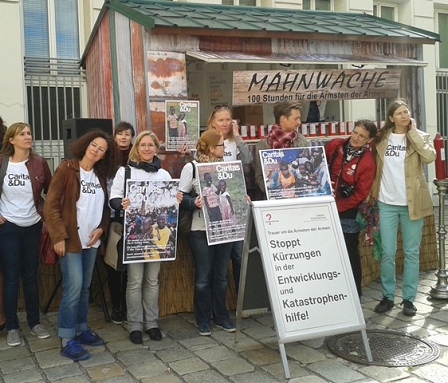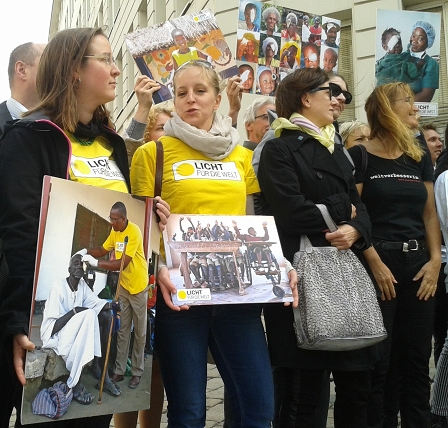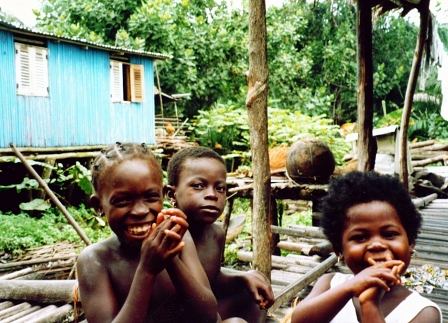Erstellt am: 12. 5. 2014 - 16:26 Uhr
A Broken Promise To The World's Poor
On the Ballhausplatz in Vienna, a huddle of activists held a minute of silence for the “poorest of the poor” on Monday within plain site of Chancellor Werner Faymann’s office.
They say Austria is failing the world’s most vulnerable citizens by slashing its budget for overseas development aid.
This year, a further 17 million Euros are to cut from the overseas aid Budget. It's the latest in a series of budget reductions that Austrian development charities and NGOs says will have “dramatic consequences” for life-saving projects on the ground.

christian cummins
The minute's silence was the beginning of a 100 hour “solemn vigil” on the Ballhausplatz aimed at provoke a policy rethink. The protest is coordinated by an umbrella group called Globale Verantwortung, made up of 45 different concern groups, including Caritas, Licht für die Welt and the Austrian Red Cross.
“It is a matter of life and death,” says Globale Verantwortung’s Annelies Vilim, “and that’s why we are going to stay here for 100 hours to find a way to move our government to stop these cuts.”
Ignoring A Cry For Help
In the fight against poverty, 17 million Euros is a huge amount of money, says Christoph Schweifer of Caritas: “With this money 200,000 people could be freed from poverty in a long term sustainable way or 400,000 undernourished children could be provided with the food that they need. To slash these 17 million Euros means refusing to respond to the cry of help of a people in need.”
Years of Cutbacks
Rupert Roniger of Licht für die Welt complains that Austria has been constantly cutting its overseas aid budget for bilateral development cooperation in recent years.
Even before the cuts, Austria devoted less of its overall budget to development cooperation aid than most other rich European countries but as recently as 2010 the government still dedicated 100 million Euros annually to bilateral development cooperation. Yet by 2015, according to Roniger, the budget is expected to be only 52 million Euros. “That means quite a lot of substantial development programmes cannot be continued.”
However Roniger is confident that the vigil will work. “I can’t believe that the SPÖ and the ÖVP can close their eyes when it is about the lives of people living in poverty in the developing world.” The NGOs have carried their own survey which they say suggests that 87% of Austrian MPs would be in favour of stopping the proposed cuts. “I hope that the Parliament and the Minister of Finance will find a solution to these problems,” says Roniger.
Globale Verantwortung has called on Chancellor Werner Faymann and Vice-Chancellor Michael Spindelegger to join the activists for a roundtable discussion on proposed cuts on Friday, as the 100 hours vigil draw to a close.

christian cummins
But are cuts to funds destined to far-off places inevitable when there is an urgent need of money at home?
Finance Ministers are understandably prone to headaches during these cash-strapped times. As well as the economic crisis of the past years, the Hypo-Alpe Adria bank crisis has burned a hole in the Austrian budget.
Yet the activists on the Ballhausplatz don’t think that these are valid excuses to cut funding of projects that help the world’s most vulnerable people. Christoph Schweifer of Caritas points to neighbouring countries such as Germany and Switzerland which have maintained or even increased their development spending in recent years. In the UK development spending is ring-fenced, even during times of recession.

chris cummins
Broken Promises
It is also a matter of trust. When the ruling Coalition announced its new programme of governance following last autumn’s elections, the plan included a promise to increase development spending step by step but the latest budget announcement contradicts that pledge.
“We have been given a lot of promises and all those promises have been broken,” says Hartwig Kirner of Fairtrade Austria. “We have to stand here and stand our ground. We have to show the government that enough is enough. They can’t cut the aid budget anymore.”
Dieses Element ist nicht mehr verfügbar
Austria seems proud these post-Eurovision days as its new found role as a beacon of diversity and tolerance. The activists on the Ballhausplatz would like Austria to reclaim its role as a country that cared about humanitarian solidarity and compassion for the poorest of the poor.


